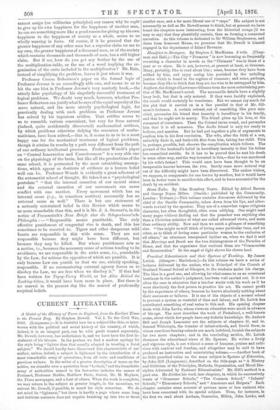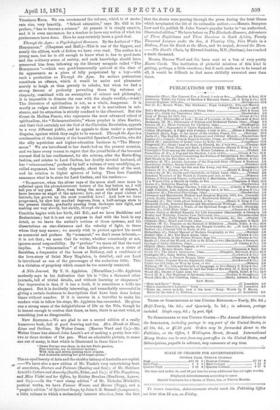Practical Educationists and their Systems of Teaching. By James Leitch.
(Glasgow : Maclehose.)—In this volume we have a series of lectures delivered by the author, who is Principal of the Church of Scotland Normal School at Glasgow, to the students under his charge. The idea is a good one, and allowing for what seems to us an occasional hastiness in the author's judgment, has been well carried out. It is too often the case in education that a teacher starts with his work as if he were absolutely the Bret person to practise his art. He cannot profit by the experience of others, because he knows absolutely nothing about their successes or failures. It is one of the objects of a normal school to prevent a system so wasteful of time and labour, and Mr. Leitch has contributed something of real value to this end. His opening chapter deals with John Locke, whose views on education were much in advance of his age. The next describes the work of Pestalozzi, a well-known name, about which few people have any definite knowledge. Dr. Andrew Bell and Joseph Lancaster are the subjects of chapters iii. and iv. Samuel Wildorspin, the founder of infant-schools, and David Stow, to whose exertions Sunday-schools are much indebted, furnish the subjects for two more chapters ; and in the concluding section, Mr. Leitch discusses the educational views of Mr. Spencer. He writes a lively and vigorous style, is not without a sense of humour, praises and criti- cises with candour and freedom, and altogether may be said to have produced an instructive and entertaining volume.—Another book of no little practical value on the same subject is Systems of Education, by John Gill (Longmans), described on the title-page as "A History and Criticism of the Principles, Methods, Organisation, and Moral Dis- cipline Advocated by Eminent Educationists." Mr. Gill's method is a good one. He divides his work into chapters, in which he successively treats of "Grammar Schools," "The Common School," "Infants' Schools," "Elementary Schools," and " Amateurs and Helpers." Each chapter contains some account of persons more or less eminent who have been concerned with its special subject Thus, for instance, in the first we read about Ascham, Comenins, Milton, John Locke, and Vicesimus Knox. We can recommend the volume, which is, of mode- rate size, very heartily. "School education," says Mr. Gill in his preface, a haa to become a science." At present it is simply empiric, and it is even uncommon for a teacher to have any notion of what his predecessors have done. Here he may certainly learn a good deal.



































 Previous page
Previous page